The Singing Bus
 I have been in Uganda for one week and have been cooling my heels. Francis, the project coordinator sympathetizes, “We Africans take a while to realize someone is here and then when they are leaving, we suddenly wake up.”
I have been in Uganda for one week and have been cooling my heels. Francis, the project coordinator sympathetizes, “We Africans take a while to realize someone is here and then when they are leaving, we suddenly wake up.”I should be better prepared for it. There are a few things I can work on, but I am only here for one month and I have a long To Do list. A muzungu, or white person, with a To Do list is a terror to behold. There is a fair amount of coordination required to organize the training I will do, however right now the quarterly financials for funders are top priority for the project staff. As well, a research conference on sustainability is underway, so I am just going to have to bide my time.
I will use my time to tag along on an exchange visit. This gives me a chance to see how one of our new areas is doing. The Community Owned Resource Persons (CORPs) are child health volunteers, who work in pairs. 117 were trained originally, starting more than two years ago. Exchange visits were their idea. When offered an annual party, they opted instead for an opportunity to visit sites where small projects in beekeeping, rain water collection, bio-gas generation from cow dung and solar heating had been started. The exchange visits were so successful in stimulating development of small projects that we have incorporated them into our program.
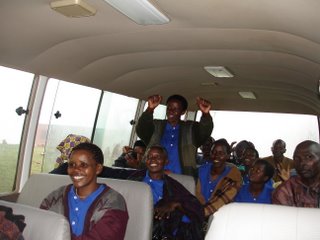 Today’s exchange visit involves a group of senior CORPs from one parish visiting newly trained junior CORPs in another. Twenty-six CORPs have been waiting under a large mango tree outside the Bwinda Health Center for more than an hour. Laughing and exchanging greetings, they clamour onto the bus. Then, we return to the university because the report forms were left behind.
Today’s exchange visit involves a group of senior CORPs from one parish visiting newly trained junior CORPs in another. Twenty-six CORPs have been waiting under a large mango tree outside the Bwinda Health Center for more than an hour. Laughing and exchanging greetings, they clamour onto the bus. Then, we return to the university because the report forms were left behind. Consolata, one of our trainers as well as the acting in-charge at Bwinda Health Center IV, laughs saying that our day is having an African start. As soon as CORPs are settled, they begin singing. It is a gloriously sunny morning and they are glad to be on their way. Their exhilaration is infectious.
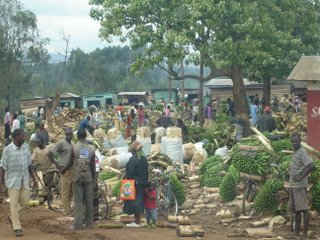
Passing a local weekly market, we turn off the main road. Bicycles, loaded with as many as seven bunches of matooke are jockeying for spaces in the market. Matooke, cooking banana, is the food staple in this region.
Rain begins to pour down heavily as our bus climbs high into the hills. The hills have been terraced to their crests, many covered with matooke plantations. Scattered homes can be identified from afar by their gleaming tin roofs.
For the first few miles off the main highway, the surface of the road has been mixed with chipped rock which provides better traction. As we proceed deeper and higher we are mostly on red murram or clay. Chris, our driver is carefully navigating around huge pot holes when suddenly, with a jolt we are stuck in a deep rut. The singing continues. The incline looks steep. By this time we are looking down on clouds. Chris backs the heavy bus up and takes a couple of different approaches to the pot hole, nearly clearing it each time. The men get out, wrap their pant legs inside their socks and begin placing rocks in strategic places. The bus continues to slip and slide from side to side in the mud.
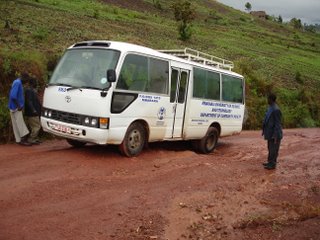
Passengers are asked to alight. A wind has come up, making it quite chilly, so wrapping their thin cotton wrappers around them, the women head up the hill to the nearest home for shelter. A one room hut, it is too small for all of them, so a group continue on to the next home.
Chris and Consolata invite me to stay on the bus with the two breast feeding mothers and their babies. But my inner alarm is starting to vibrate. Road accident rates for East Africa, corrected for kilometers of road and number of vehicles, are among the highest in the world. I thank them nicely for their concern and soon I, too, am slip-sliding on the road.
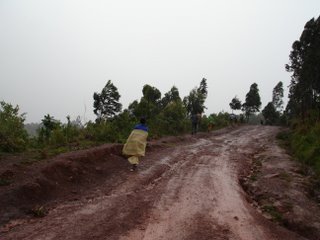
The bus continues to lumber up and down the hill. On the 10th run, it finally surges out of the hole with the wheels kicking up red murram on the men at the back who are pushing. Those of us still on the side of the road cheer and run to catch up as it continues to the top of the rise.
There is no grumbling about the problems with the bus, the chill on the hill top or the long scramble to shelter. Although everyone’s shoes are caked with mud, they are delighted to be back on the bus. As soon as the group is seated onboard once again, the singing resumes. I can pick out more words such as Yesu (Jesus), Katonde wange (my God ) and Mukama (Lord) in the songs now, as well as improvised tributes to the driver, the pilot and the men who helped push, so it is clear they have understood how dangerous it was.

We arrive tired but happy to be greeted by the host CORPs who are shifting school desks into the room where we will gather. The walls are roughly sawed planks with window openings cut out and a mud floor. Long pine needles have been sprinkled about the floor in preparation for our arrival. A small rivulet of rainwater streams in the door. Our hosts soon have hot African tea, which is half milk in this cattle country, and buns for us which are greatly appreciated.
The area is very remote. There are few muzungus who pass this way. Maybe none. The kids crowd around to watch me. When this site was first suggested, we were advised by the university that it was too remote. We heard them out but in the end decided it was just the place for us. And so it seems to be.
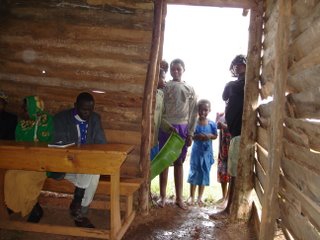
As they are far from the Health Center which supervises them, the local CORPs will be combining this visit with their monthly reporting. Consolata returns from meeting with them, brimming with admiration for all that they have managed to do in the four short months since they were trained. Unfortunately, because of the ongoing deluge, we will be unable to view the demonstration gardens, visit the model homes or inspect the new latrines. I am amazed that they are doing all the cooking as well as organizing and entertaining for this event. Consolata and I discuss how it seems as if the second group of CORPs, seeing what the first group have accomplished in two years, have been inspired. It is as if they have a jump start.
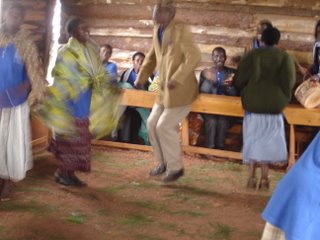
Jumping is what has been going on in the meantime as the senior CORPs have been Ankole dancing to keep warm. This involves a lot of leaping and stylized arm movements. Everybody joins in singing, drumming on the desks and taking turns dancing. Even I have a go at it, which causes much hilarity.
The meal has been prepared in large aluminum cooking pots calle
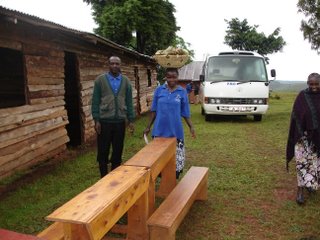 d sikiri which are balanced on three stones over a fire. The matooke, posho, cassava, rice, groundnuts and even the meat are all wrapped in banana leaves. Steaming food in banana leaves produces a distinct and delicate flavour, similar to smoking. If Ugandans want a good meal, they say they have to go to the village, where all food is prepared in this way.
d sikiri which are balanced on three stones over a fire. The matooke, posho, cassava, rice, groundnuts and even the meat are all wrapped in banana leaves. Steaming food in banana leaves produces a distinct and delicate flavour, similar to smoking. If Ugandans want a good meal, they say they have to go to the village, where all food is prepared in this way.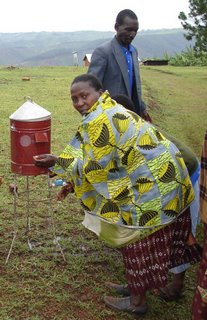
The rain has finally stopped, desks are brought outside and food wrapped in banana leaves is offered in Ankole baskets. A portable water tap from the local health unit has been set up for handwashing. The host CORPs proudly serve the entire group which by now includes representatives of all five levels of government.
After eating our hosts present a short drama on antenatal care for high risk cases, sing several songs lead by a strong tenor and do some serious Ankole dancing complete with costumes. The visiting lady counsellor from Mbarara tells us that because she has married this place, meaning her husband is from here, she is especially happy to see the authentic Ankole dances. Living in the city, she hasn't seen the real thing since she was a small child. At that time, she tells us, it was dark outside so she didn't see much.
Our hosts have also organized a gift exchange. This is an innovation. One after another they present gifts to their special friends among the visiting CORPS. Baskets, mats, glasses, china bowls, handkerchiefs, even a chicken are exchanged. One friend is absent so the CORP gives her gift to Consolata because she has been a friendly trainer.
On the way back, it takes us more than three hours to get down the hill. In one long stretch of flat road, all of us leave the bus to walk alongside as the back end swings from side to side in the slippery clay. Local men come to help push. Then that too is behind us and the singing bursts forth once again. It is pitch black when we arrive back at the highway. Chris agrees to make two trips up side roads that will deliver many of them closer to their homes. Two by two they are dropped off.
The singing keeps up until the very last group is deposited at a small trading center. Their singing has keep us going the whole day long. They sing in harmony, often in a call and response pattern. Like geese in formation, the lead frequently changes. There are enough repititions that I can sing along. Strong male basses boom out a background beat. Hands clap, rattles shake, drums beat and feet stamp. Laughter puntucuates the musical selections. Even sitting in the bus, bodies are moving and shaking in time to the music. What an exuberant, joyful group!
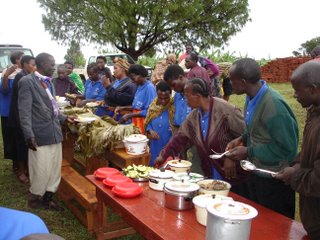
Up the side roads, there is no electricity, only scattered candles behind doors. With Ramadan just a few days behind us, there is only a sliver of a moon in the sky. Kerosene lanterns gutter in the night breeze as a few people move in and out of small shops. Most of the CORPs still have a way to go before they reach home, even the two mothers with the babies on their backs. But they are happy to be dropped away from the main highway and seem almost euphoric from all the singing.
"Some of them still have a long walk up the hills", Consolata reassures me,"but they will be OK now. "
There is complete silence as the five of us remaining on the bus head back to the university. I think Chris will be glad of some peace and quiet after this stressful day, but after a few minutes he turns on the radio. It seems the singing has also sustained him.
It is after ten pm when I reach home and still so dark that I stumble on the uneven ground as I make my way through the compound. Instead of focusing on that, I notice that it is a great night for star-gazing. The stars fill the night canopy of the sky like small brilliants, winking off and on in a manner I could never see in the city. I know down deep that this day captures the essence of why I love Africa and my work here. Being in another culture, I am encouraged to notice what is happening, not what I think should be happening. I have been given what I needed and not what I thought I wanted.
Photos: Mwizi hills, singing CORPs, weekly market, bus in hole, runing for shelter, children at the door, Ankole dancing, entering the room, local hand washing, bringing out the food, communal meal.
Labels: Uganda


9 Comments:
What a wonderful story! I remember African singing when I was a child. Everything, including manual labour was done with singing. To this day, I love listening to rich, harmonic African voices. I did home visits today in steady rain, and felt a little grumpy, but I didn't have to deal with mud and pot holes and delays. Thanks for a reality check!
Fabulous account of your day. One of my aunts was involved in setting up a school for children who were blind or vision-impaired in Ethiopia, and she rapidly learned that she couldn't plan her travels because the rains would readily wash away a road.
Thanks for writing this.
Regards - Shinga
Oh my,I want to dance right now! Except I'm in Starbucks and the only music is Bob Dylan....
This is a great story. Can you imagine if we could tap that energy,that joy, the easy-going attitude in the US?
Thanks for such a great glimpse into another culture.
And I think I'll sing in the car on the way home....
Wonderful story! Thank you. YOur blog, and what you are doing, are gifts to us all.
Amazing story. So well written, for a moment, I was on that bus too.
Ruth- Thank you. The singing is something else.
Shinga - I think that is what African time really is, a taking into account ALL the various contributions to the minute.
Kim- Welcome. Bob Dylan claims African-American influences and where do you suppose those came from? Thanks for dropping by.
tbtam - Kind of you to say and welcome.
healthpsych - You're right, it is difficult not to be part of it.
What a wonderful post! Thank you so much for sharing all of that with us. It's as if we've been able to come to Uganda to experience all of it with you.
You should submit your blog to Blogburst!
A variety of news sites pick on the Blogburst feeds, and include them in their daily news - SF Gate, Washington Post, etc. ... your posts are just the sort of thing the news sites seem to like ...
Great post Travelling Doc.
'Yesu' stands for Jesus in Tamil too.
Moof - You are so generous with your praise. Blogburst indeed! I can't even get my typos fixed on the third go. But I will go have a look. Thank you.
Vijay - I love all these Tamil connections in words. Thanks.
Post a Comment
<< Home